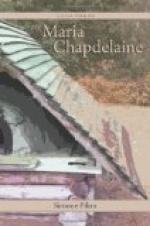His speech was so honest and straightforward that he made them one and all feel what manner of thing was a disorder of the human frame—the strangeness and the terror of what is passing behind the closed door, which those without can only fight clumsily as they grope in dark uncertainty.
“She will die if that be God’s pleasure.”
Maria broke into quiet tears; her father, not yet understanding, sat with his mouth half-open, and neither moved nor spoke. The bone-setter, this sentence given, bowed his head and held his pitiful eyes for long upon the sick woman. The browned hands that now availed him not lay upon his knees; leaning forward a little, his back bent, the gentle sad spirit seemed in silent communion with its maker—” Thou hast bestowed upon me the gift of healing bones that are broken, and I have healed them; but Thou hast denied me power over such ills as these; so must I let this poor woman die.”
For the first time now the deep marks of illness upon the mother’s face appeared to husband and children as more than the passing traces of suffering, as imprints from the hand of death. The hard-drawn breath rattling in her throat no longer betokened conscious pain, but was the last blind remonstrance of the body rent by nearing dissolution.
“You do not think she will die before the cure comes back?” Maria asked.
Tit’Sebe’s head and hand showed that he was helpless to answer. “I cannot tell ... If your horse is able you would do well to seek him with the daylight.”
Their eyes searched the window, as yet only a square of darkness, and then returned to her who lay upon the bed ... But five days ago a hearty, high-spirited woman, in full health of mind and body ... It could not be that she was to die so soon as that. ... But knowing now the sad inevitableness, every glance found a subtle change, some fresh token that this bed-ridden woman groaning in her blindness was no more the wife and mother they had known so long.
Half an hour went by; after casting his eyes toward the window Chapdelaine arose hurriedly, saying.—” I am going to put the horse in.”
Tit’Sebe nodded. “That is well; you had better harness; it is near day.”
“Yes. I am going to put the horse in,” Chapdelaine repeated. But at the moment of his departure it swept over him suddenly that in going to bring the Blessed Sacrament he would be upon a solemn and a final errand, significant of death. The thought held him still irresolute. “I am going to put the horse in.” Shifting from foot to foot, he gave a last look at his wife and at length went out.
Not long after the coming of day the wind rose, and soon was sounding hoarsely about the house. “It is from the nor’west; there will be a blow,” said Tit’Sebe.
Maria looked toward the window and sighed. “Only two days ago snow fell, and now it will be raised and drift. The roads were heavy enough before; father and the cure are going to have trouble getting through.”




